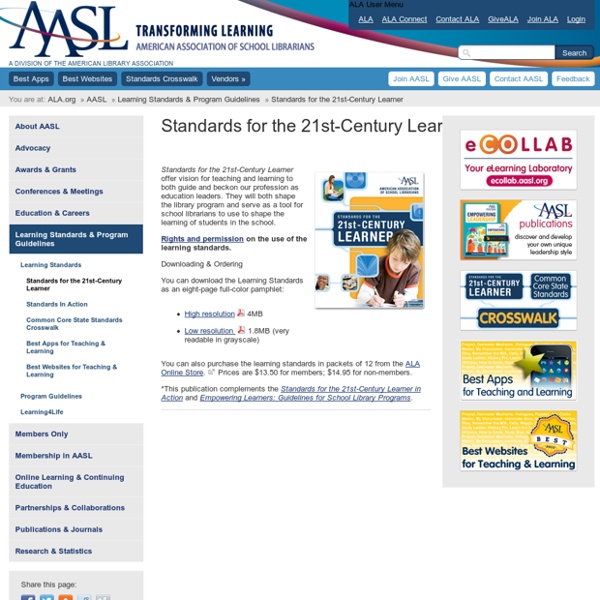nchsneasc13
This is the portal for New Canaan High School's self-study in the New England Association of Schools and Colleges (NEAS&C)'s accreditation process. The visit is scheduled for April 2013. For inquiries, please contact us. Thank you!
Teaching Digital Citizenship in the Elementary Classroom
As elementary level teachers, we are charged not just with teaching academics, but teaching social skills as well. "Ignore bullies and tell an adult if you feel threatened," "Don't talk to strangers," "Treat people the way you want to be treated." You're probably familiar with phrases similar to these if you teach the younger grades.
Crosswalk of the Common Core Standards and the Standards for the 21st-Century Learner
Skip to main content ALA User Menu Search form A Division of the American Library Association
The Dignity for All Students Act
New York State’s Dignity for All Students Act (The Dignity Act) seeks to provide the State’s public elementary and secondary school students with a safe and supportive environment free from discrimination, intimidation, taunting, harassment, and bullying on school property, a school bus and/or at a school function. The Dignity Act was signed into law on September 13, 2010 and took effect on July 1, 2012. Amendments to the act are effective as of July 1, 2013 and are noted below under ***DIGNITY ACT NEWS***. The original legislation amended State Education Law by creating a new Article 2 – Dignity for All Students.
The Flipped Classroom: Pro and Con
In 2012, I attended the ISTE conference in San Diego, CA. While I was only there for about 36 hours, it was easy for me to pick up on one of the hottest topics for the three-day event. The "flipped classroom" was being discussed in social lounges, in conference sessions, on the exhibit floor, on the hashtag and even at dinner. People wanted to know what it was, what it wasn't, how it's done and why it works. Others wanted to sing its praises and often included a vignette about how it works in their classroom and how it transformed learning for their students.
plasq.com
Comic Life 3 is now available for both Mac and Windows! “4 Stars and Editors Choice.” MacUser Dec. 2013 "Awesome!...
5 Excellent Videos to Teach Your Students about Digital Citizenship
Edutopia is one of my favourite educational web resources . Today while I was checking its Five Minute Film Festival page I came across a link that took me to their YouTube channel where I found a treasure trove of interesting videos on digital citizenship and because digital citizenship is one of the important themes in this blog, I decided to handpick some of the clips that grabbed my attention and share them with you below , you can also check the entire list here. But before that, let me share with you this concise and to-the-point definition that Amy gave to digital citizenship : "Digital citizenship" is an umbrella term that covers a whole host of important issues. Broadly, it's the guidelines for responsible, appropriate behavior when one is using technology. 1- What is Digital Citizenship
Napoleon's trial
If our NCHS career as partners in learning was a book that was segmented in to parts, this project would mark the beginning of Part II. Part I is about learning how to access your library's services. Part II is about the research process.
Library and Information Studies (LIS)
Department of Library and Information Studies Office of Graduate Admissions and Student Services Office of Admissions Welcome! I’m delighted that you’re visiting our website, and I extend my warm wishes to get in touch or visit us.
Find Products & Services - ProQuest Historical Newspapers
More than just the article Front-page headlines, classified ads, marriage and death announcements, comic strips, reviews, display advertising, editorials, birth notices, photographs, and many other article types combine to help today’s researchers not only understand the news of yesteryear, but also the context in which it was made. Find information quickly ProQuest makes it easy for both novice and experienced researchers to find relevant information quickly, with basic and advanced search options. And, because the newspapers in this collection reside on a single platform, users can cross-search all ProQuest Historical Newspapers titles with one another and with all other ProQuest resources a library may have. Transcend time AND geography!
Digital Citizenship & a poster for your school
EdTech Published on April 20th, 2013 | by Mark Anderson 10inShare Digital Citizenship is an area of massive importance and if you’re interested you should really check some of the links at the end of this post. Following JISC and looking at their work and connecting with the likes of @dughall, @simfin and @dajbelshaw among many others and @naace would be a great way forward.



